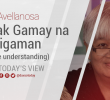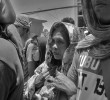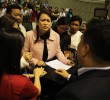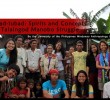The capitalist school-owner would not bother about who cannot enroll and be educated because there are always several others who can pay. In business the law of supply and demand always holds its sway. Sori ka na lang kung wala kang pang-tuition!
By DON J. PAGUSARA
Davao Today
With the very sad and outrageous incident about the University of the Philippines scholar who died by suicide because of failure to pay for her enrolment, it is good to revisit the discussion on the essential character of the Philippine educational system.
Time and again, we are faced with a phenomenon that pushed Filipino students to the streets to protest against the glaring facts that comprise the essential character of our educational system. Each time, the crying demand of these mass protests is aimed against the incessant “increase of tuition fees.”
But at the back of this slogan is the undeniable fact that education in our society is a business undertaking. Education, like any other commercial item, is a commodity. Its cost depends upon the “whim for profit” — and more profit! — of the capitalist educator. “Business is business,” so they say.
The capitalist school-owner would not bother about who cannot enroll and be educated because there are always several others who can pay. In business the law of supply and demand always holds its sway. Sori ka na lang kung wala kang pang-tuition!
The other essential nature of Philippine education is that it is colonial — meaning it is premised on the needs and purposes of our erewhile colonizers, chief of whom the American colonizers.
In the first place, the medium of instruction has to be English. And so, language which is the soul of a people’s culture has to be the language of the Americans. And what is the result?
We educated Filipinos have become lovers of the English language. We are taught to despise and shun our own native tongue. Nahimo tang larino sa iningles, apan yungit sa atong kaugalingong pinulongan. Hambog pa kaayo ang uban kanatong moingon nga: Ay, English man ang akong first language! (We have become very articulate in English but dumb in our own language. Others even brag, Oh, English is my first language!)
And, of course, we are very good students. Little do we realize that to be educated is become an alienated Filipino — a stranger to his own language, his own literature, his own culture, his own history, his own people.
In high school we had Prose and Poetry of England and History of America, as major subjects. But we did not havePhilippine Prose and Poetry.
So what happens is that the Filipino youths, whose quest for education is evident in the thousands upon thousands of graduates in colleges and universities across the country, have become little brown Americans who, wittingly or unwittingly, promote and pursue the interests of the Americans rather than advance the welfare and needs of our country.
Ironically, our education has worked for the stagnation of our national economy and has failed to meaningfully establish our national sovereignty and national identity with purposive vigor.
This unfortunate incident involving the UP scholar is a glaring proof of how our educational system has been a big disservice to the Filipino. I cry in angry protest against the injustice to the poor UP scholar. What happened to her is a succinct characterization of Philippine education. My heart bleeds even as I write the following…
A Dirge for Kristel
i found her napalgan ko siya
on an infant morning sa usa ka linghod nga buntag
on the seashore sa daplin sa baybayon
collecting droplets of namuphog mga lugas
moments and dreams sa handom ug mga damgo
under the sun ilawom sa silaw sa adlaw
her eyes mirrored gisalamin sa iyang mga mata
the laughter of pebbles ang katawa sa mga pinong bato
and seashells washed ug mga tipakang nahugasan
by rains and seawaves sa ulan ug mga balod
in the night sa miaging gabii
sunbeams natipun-og sa iyang panagway
collect on her face ang sidlak sa adlaw
as she danced on tiptoe samtang misayaw siyang nagkinto
on the warm sand sa balasong baybayon
and what seems an emerald isle ug sa pikas nga utlanan sa dagat
on the other limit of the sea may murag hitsurag emeraldang isla
kept on beckoning her nag-utas og pangamay kaniya
but there was no banca apan wala siya kakitag bangka
to take her nga iyang kasakyan
to the emerald isle, a mirage ngadto sa emeraldng isla, lamat
shining like a jewel nga nagsidlak murag brilyante
in the sun sa dan-ag sa adlaw
and she kept on dancing ug nagpadayon siya pagsayaw
on tiptoe, pirouetting nga nagkinto, nagtuyok-tuyok
lifting her arms nga dinupa ang mga bukton
opening her palms binukhad ang mga palad
to the clouds ngadto sa mga panganod
as she moved towards the sea ug nag-anam siyag duol sa dagat
and her toes were kissed by the waves hangtod gihagkan sa balod iyang mga tiil
and her tongue quivered ug mikurog ang iyang dila
and her breasts thundered ug midalugdog iyang dughan
and she walked past the shore ug milakat siya lapas sa baybayon
towards the beacon of her ngadto sa tulmana sa iyang
quest eternal. way-kinutobang pangandoy.
Don J. Pagusra is a native of Mindanao, a multi-awarded author and a Palanca-awardee.

![[STANDPOINT] Illegal drugs and the NIMBY mindset](https://davaotoday.com/wp-content/uploads/2016/09/Mags-Maglana_UPMIN-Sept.-20-110x100.jpg)








